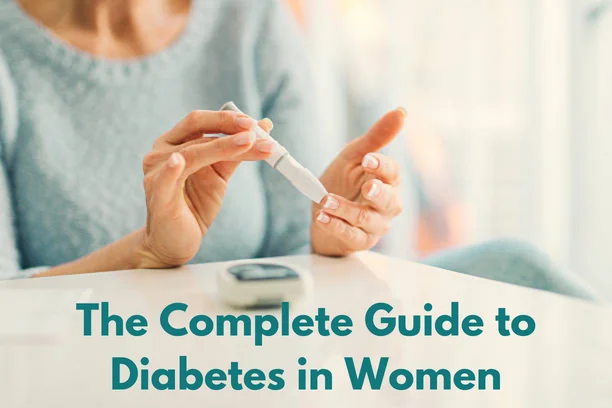The Complete Guide to Diabetes in Women
4 minuteRead

According to a study on the prevalence of diabetes in middle-aged women in India that was published online in the May 2020 issue of the Journal of Diabetes and Metabolic Disorders, 254 of the nation's 640 districts have a very high (greater than 10%) level of the disease, and 130 have a moderately high level (8.7-10.6%). The rates were lowest in the country's center and greatest among women in southern and eastern India.
Around 200 million women worldwide have diabetes, and as India is the diabetes capital of the world, the number of undiagnosed women here is significantly higher. In a population of 1.2 billion, women account for around 30 million diabetics!
The Basics of Diabetes
Diabetes is a cluster of metabolic disorders where a person experiences elevated blood glucose levels, commonly referred to as blood sugar, due to difficulties in producing or utilizing insulin. The hormone insulin plays a crucial role in converting the carbohydrates you consume into energy that your body can use.
There are three types of diabetes.
Type 1: Type 1 diabetes is a chronic condition where the body's immune system destroys the cells that produce insulin, leading to a complete deficiency of the hormone and requiring the person to take daily insulin injections for survival.
Type 2: Type 2 diabetes is a condition where the body either doesn't produce enough insulin or doesn't properly use the insulin it does produce, causing high blood sugar levels. This type of diabetes is often associated with obesity, physical inactivity, and an unhealthy diet.
Gestational diabetes: It is a type of diabetes that develops during pregnancy and affects the woman's ability to regulate blood sugar levels.
How does diabetes affect women differently?
Diabetes affects women differently than men in several ways, including during pregnancy, hormonal changes, and increased risk for certain complications. Women with diabetes may experience higher rates of complications during pregnancy, such as birth defects and gestational diabetes, which can affect both mother and baby.
Hormonal changes during menopause can also impact blood sugar control in women with diabetes. Additionally, diabetes causes in women an increased risk for conditions such as heart disease, nerve damage, yeast infections, UTIs, and eye problems.
Symptoms of Diabetes in Women
Many of the symptoms of diabetes might be shared by both men and women. Some symptoms, however, are specific to women. Understanding these signs and symptoms may help you spot diabetes earlier and begin treatment.
- Irregular periods
- Painful sex
- Vaginal infections, itching, and irritation
The general symptoms of diabetes include:
- Excessive thirst
- Frequent urination
- Sudden changes in weight without any effort
- Extreme Fatigue
- Blurred vision
- Slow-healing cuts or sores
- Tingling or numbness in the hands and feet
It's important to note that some people with diabetes may not experience any symptoms at all, and only find out they have the condition through routine blood tests. If you have any concerns about diabetes, it's essential to talk to your doctor.
Diabetes and Women’s Health
Women's health and diabetes are closely linked as women are at an increased risk for developing diabetes due to hormonal changes, pregnancy, and certain lifestyle factors. During pregnancy, women with pre-existing diabetes or who develop gestational diabetes are at increased risk for complications, such as pre-eclampsia and macrosomia.
Diabetes and Pregnancy
Having a baby and living with diabetes may seem like a challenge, but it can be done! The key is to work closely with your doctor to check your blood sugar levels and overall health before and during pregnancy. It's a good idea to aim for your most healthy blood sugar levels before getting pregnant, as your target ranges may change during pregnancy.

When you're expecting, your blood sugar and ketones travel to your baby, and too much sugar can cause health problems for your little one. Don't worry, by staying on top of your health and working closely with your doctor, you can have a healthy pregnancy and a healthy baby.
How can Diabetes be prevented?
Here are some steps women can take to reduce their risk of developing diabetes:
- Maintain a healthy weight: Excess body fat can increase insulin resistance, which is a major risk factor for type 2 diabetes.
- Exercise regularly: Physical activity can help regulate blood sugar levels and improve insulin sensitivity.
- Eat a balanced diet: Focus on consuming plenty of fruits, vegetables, whole grains, and lean protein, and limit your intake of added sugars, saturated fats, and processed foods.
- Quit smoking: Smoking is a risk factor for many chronic conditions, including diabetes.
- Manage stress: Chronic stress can affect hormone levels and increase the risk for chronic conditions, including diabetes.
- Get enough sleep: Lack of sleep can affect hormones that regulate hunger and metabolism, increasing the risk for obesity and type 2 diabetes.
- Get regular check-ups: Regular check-ups and blood tests can help detect prediabetes or diabetes early and allow for prompt treatment and lifestyle changes.

By adopting these healthy habits, women can reduce their risk of developing diabetes and maintain good overall health.
Diabetes Treatment and Management
Managing diabetes is an ongoing process that requires a team approach between you, your healthcare provider, and support from family and friends. With the right treatment and management plan, women with diabetes can lead healthy and active lives. By staying informed and proactive, women can effectively manage their diabetes and protect their overall health.
P.S.- Always consult your doctor if you notice any of the above symptoms.
Write, Record and Answer! Consume Unlimited Content! All you need to do is sign in and its absolutely free!
Continue with one click!!By signing up, you agree to our Terms and Conditions and Privacy Policy.











